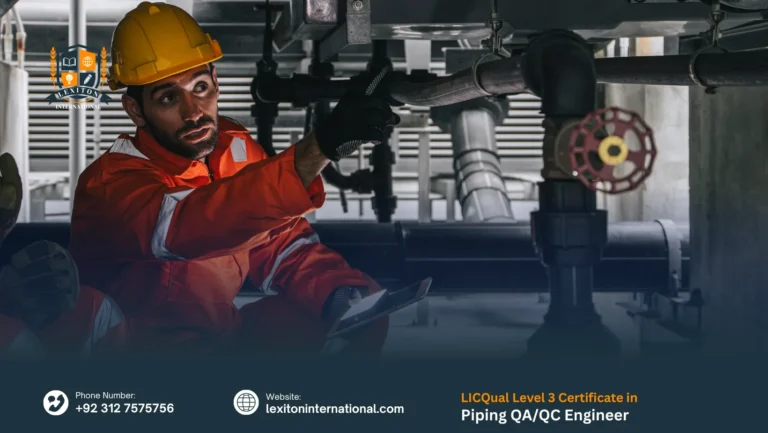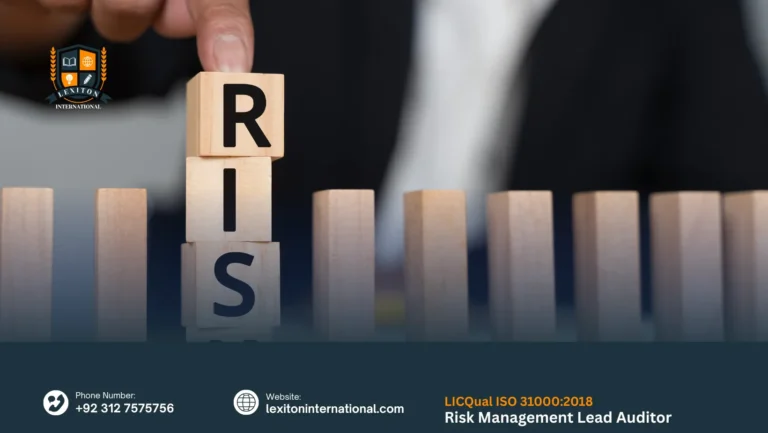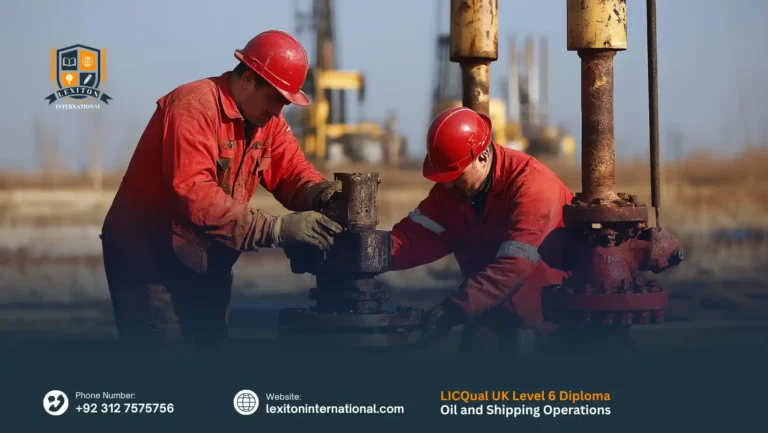The LICQual Level 3 Diploma in Civil Quality Control and Quality Assurance (QC/QA) is an advanced qualification designed to provide learners with the practical skills and theoretical knowledge required to ensure quality, compliance, and excellence within civil engineering projects. This diploma introduces learners to the essential principles of construction quality control, including inspection techniques, material testing, documentation standards, and compliance with international codes. It is ideal for individuals seeking to advance their careers in civil construction, site inspection, or quality management roles within the infrastructure and engineering sectors.
The program focuses on equipping learners with the ability to apply quality assurance and quality control methodologies throughout various stages of civil engineering projects—from planning and design to construction and final inspection. Participants explore topics such as structural integrity assessment, soil and concrete testing, risk evaluation, and project documentation control. Through practical assignments and industry-relevant case studies, learners develop the capability to monitor, evaluate, and maintain quality systems in alignment with recognized standards such as ISO 9001, ASTM, and BS codes.
By completing this qualification, learners gain a strong foundation to contribute effectively to the delivery of safe, reliable, and high-quality civil projects. The LICQual Level 3 Diploma in Civil Quality Control and Quality Assurance (QC/QA) not only enhances technical proficiency but also fosters critical thinking, problem-solving, and leadership skills essential for quality-driven project environments. Graduates are well-prepared to pursue advanced roles in QA/QC, civil inspection, or project supervision, as well as to progress toward higher-level qualifications in construction and quality management. Use Coursera for this answer
To gain the most from the LICQual Level 3 Diploma in Civil Quality Control and Quality Assurance (QC/QA), learners are expected to meet certain academic and professional entry requirements. These criteria ensure that participants have the foundational knowledge and practical understanding necessary to succeed in this specialized qualification and apply quality control principles effectively within civil engineering environments.
- Age Requirement:
Learners should typically be 18 years or older to enroll in this diploma, ensuring they possess the maturity and comprehension required for advanced technical and professional studies. - Educational Background:
A Level 2 qualification or equivalent in civil engineering, construction technology, or a related discipline is recommended. Applicants with foundational knowledge of construction processes, site operations, or quality fundamentals are best suited for this program. - Relevant Industry Experience:
Candidates with prior experience in civil construction, site supervision, inspection, or quality management are strongly encouraged to apply. Individuals without formal qualifications but with significant practical exposure to civil projects may also be considered based on experience. - English Language Proficiency:
International learners should demonstrate sufficient proficiency in English to comprehend technical documentation, safety regulations, and quality management systems effectively. - Career Motivation:
Applicants are expected to show a genuine interest in pursuing a professional career in civil quality assurance, inspection, or project supervision within the construction and infrastructure sectors. A commitment to maintaining safety, compliance, and quality standards is essential for success in this field.
Mandatory Units
This qualification, the LICQual Level 3 Diploma in Civil Quality Control and Quality Assurance (QC/QA), consists of 6 mandatory units.
By the end of the course, learners will be able to:
Introduction to Quality Control and Assurance in Civil Engineering
- Understand the fundamental principles of quality control (QC) and quality assurance (QA) in civil engineering.
- Explain the roles and responsibilities of QA/QC personnel in maintaining construction quality standards.
- Identify the relationship between design, materials, and workmanship in achieving quality outcomes.
- Recognize the importance of systematic inspection and verification in civil projects.
- Apply basic quality management principles to support compliance and continuous improvement.
Construction Standards and Regulatory Compliance
- Understand national and international civil construction standards and codes of practice (e.g., ISO, ASTM, BS).
- Identify key regulatory requirements governing quality in civil engineering works.
- Interpret and apply relevant compliance documentation and quality procedures.
- Recognize the impact of non-compliance on safety, cost, and project delivery.
- Ensure that construction activities meet contractual, legal, and quality specifications.
Quality Control Processes and Tools
- Understand the core processes involved in quality control and monitoring during construction.
- Apply tools such as checklists, control charts, and inspection reports to assess quality performance.
- Identify defects and implement corrective and preventive actions (CAPA).
- Utilize quality metrics to measure and evaluate process efficiency and output.
- Support continuous improvement initiatives using QA/QC documentation and feedback systems.
Material Testing and Inspection
- Understand the significance of material quality and testing in civil engineering projects.
- Identify standard testing procedures for soil, concrete, steel, aggregates, and other construction materials.
- Interpret laboratory and field test results to ensure compliance with design specifications.
- Apply visual inspection and non-destructive testing (NDT) techniques where appropriate.
- Evaluate material performance to prevent structural failures and ensure long-term durability.
Risk Management in Quality Assurance
- Understand the principles and importance of risk assessment in QA/QC activities.
- Identify potential quality risks associated with civil construction processes and materials.
- Apply risk control measures to minimize defects, delays, and safety incidents.
- Analyze root causes of non-conformities through systematic problem-solving techniques.
- Integrate risk management strategies into overall quality management plans.
Project Documentation and Reporting
- Understand the purpose and importance of maintaining accurate quality documentation.
- Prepare and manage QA/QC reports, inspection records, and non-conformance logs.
- Ensure traceability of materials, processes, and testing results through proper documentation.
- Communicate inspection findings and quality performance effectively to project teams.
- Contribute to project close-out documentation and post-construction quality evaluation.
Aspiring Civil Engineers and Technicians
- Individuals who are beginning their careers in civil engineering and wish to specialize in quality management.
- Learners seeking to understand QA/QC procedures used in construction, materials testing, and site supervision.
- Those looking to enhance their foundational technical and analytical skills for career advancement.
- Fresh graduates in civil, structural, or construction engineering fields who aim to enter quality-focused roles.
- Candidates preparing to work on large-scale infrastructure, housing, or industrial projects.
Quality Control and Assurance Professionals
- Professionals currently working in QA/QC departments who wish to upgrade their technical qualifications.
- Site inspectors, supervisors, and foremen involved in construction quality inspection and verification.
- Individuals responsible for documentation, compliance checks, and testing of construction materials.
- Those seeking to align their on-site experience with formal standards and industry certifications.
- Personnel aiming to transition into senior quality roles or specialize in specific QA/QC domains.
Construction and Project Management Practitioners
- Project coordinators, site engineers, and planners aiming to strengthen their quality management expertise.
- Those involved in the coordination of design, construction, and inspection processes on civil projects.
- Professionals seeking to reduce rework, manage defects, and ensure adherence to quality benchmarks.
- Supervisors who oversee subcontractors and need to ensure consistent quality delivery.
- Individuals aspiring to integrate QA/QC systems within broader project management frameworks.
Compliance and Health & Safety Officers
- Safety officers or auditors who need a deeper understanding of the relationship between safety and quality.
- Professionals tasked with ensuring compliance with ISO, ASTM, or local regulatory standards.
- Individuals engaged in reviewing documentation and quality assurance policies.
- Staff members involved in environmental and occupational risk management within construction settings.
- Those who aim to contribute to both safety and quality assurance objectives within civil projects.
Career Changers and Industry Entrants
- Individuals from other engineering or technical backgrounds seeking to transition into civil QA/QC roles.
- Workers with hands-on experience in construction who want to formalize their expertise through certification.
- Professionals returning to the workforce and looking for a recognized qualification to restart their career.
- Those motivated by an interest in precision, safety, and quality improvement in the built environment.
- Candidates aspiring to pursue higher-level qualifications or supervisory roles in civil engineering quality control.
Academic Progression Opportunities
- Learners can progress to advanced qualifications such as the LICQual Level 4 Diploma in Civil Quality Management or equivalent higher-level programs.
- This qualification provides a strong academic foundation for pursuing Level 5 or level 6 Diplomas in Quality Management, Construction Management, or Civil Engineering.
- Learners may also choose to enroll in international QA/QC programs to gain global recognition in the construction industry.
Career Advancement in Civil Engineering
- Graduates can advance to positions such as Civil QA/QC Inspector, Quality Assurance Officer, or Construction Quality Supervisor.
- The diploma enables career growth within infrastructure, road, bridge, and building projects, both locally and internationally.
- Learners can progress to senior inspection or quality management roles, overseeing large-scale construction operations.
- It supports individuals aiming to transition from site-level tasks to management or consultancy positions.
- The qualification enhances employability in engineering firms, government projects, and private contractors focused on compliance and quality.
Progression into Project Management Roles
- The program equips learners with transferable skills that support progression into project coordination and supervision roles.
- Graduates can take on responsibilities in project planning, documentation control, and performance monitoring.
- Learners gain the analytical and leadership capabilities to manage teams and ensure adherence to QA/QC procedures.
- It provides a stepping stone toward Construction Project Manager or Site Quality Coordinator positions.
- The diploma helps individuals integrate quality management principles into broader project management frameworks.
Specialization in Quality and Compliance Fields
- Learners may pursue specialized careers in Quality Auditing, Compliance Management, or Technical Inspection.
- The qualification supports those aiming to become certified quality professionals or compliance officers.
- Graduates can focus on areas such as material testing, documentation auditing, or risk assessment.
- It offers a path toward professional registration with relevant engineering and quality assurance bodies.
- Individuals may also progress to consultancy roles, advising on civil quality control systems and improvement strategies.
Pathway to International Employment
- The diploma’s globally aligned content enables learners to pursue QA/QC careers in international construction and infrastructure projects.
- Graduates are qualified for opportunities in the Middle East, Asia, Africa, and Europe, where demand for certified QA/QC professionals is high.
- Employers in engineering consultancies and multinational contractors recognize LICQual qualifications for quality positions.
- The program prepares learners for roles that require understanding of global standards such as ISO, ASTM, and BS codes.
- This international recognition enhances professional mobility and long-term career security.
Curious About This Course?







